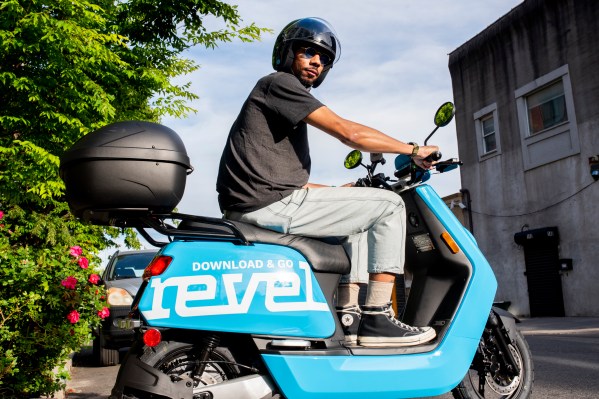
Shared electric moped startup Revel received a permit that will allow it to operate in San Francisco, beginning in August.
The startup will start with a fleet of 432 mopeds featuring a new paint scheme and a more powerful engine to help riders get up and over the city’s infamously steep hills. For now, the service area will cover certain neighborhoods of San Francisco, including Cow Hollow, Dogpatch, the Financial District, Golden Gate Heights, Haight-Ashbury, the Mission District, Outer Mission, Pacific Heights, the Richmond District, the Tenderloin and the Castro. The service area will expand in the “near future,” Revel said.
Only licensed drivers with the Revel app can rent the mopeds. Each Revel can carry up to two riders, is limited to local streets and is capped at a speed of 30 miles per hour. Revel rides will cost $1 per person to start, followed by $0.39 per minute to ride.
Each Revel moped is equipped with two U.S. DOT-certified helmets that must be worn at all times. The company also provides third-party liability insurance automatically to all riders.
Revel, founded in March 2018 by Frank Reig and Paul Suhey, started with a pilot program in Brooklyn and later expanded to Queens. Revel has been on a fast-paced growth track, expanding to Austin, Miami and Washington, D.C in its first 18 months of operation. In January, the company launched in Oakland. The company also operates in sections of Manhattan, as well as south and central Bronx.
Revel is a bit different than some of the shared mobility startups out there. The company doesn’t rely on gig economy workers to charge its mopeds — a method used by e-scooter companies like Bird. Instead, Revel has full-time workers that maintain the mopeds and swap out the batteries as needed.
The company said it will begin hiring workers in San Francisco once it launches in August. Revel said it is participating in the First Source Hiring Program to find local employees.
The startup raised $27.6 million in capital last October in a Series A round led by Ibex Investors — funds required to fuel its expansion plans. The equity round included newcomer Toyota AI Ventures and further investments from Blue Collective, Launch Capital and Maniv Mobility.

Recent Comments